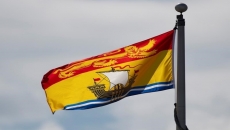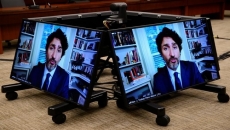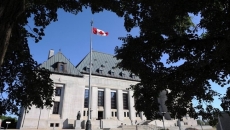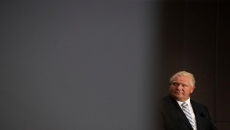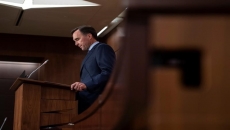The cost to consumers of Prime Minister Justin Trudeau's keystone environmental policy will have to rise if the country is to meet its Paris climate accord goals, the parliamentary budget office says, just as the country may be finally pulling itself out of a historic recession.
The question is how much the federal carbon price will have to increase and who pays it.
As it is, Canada is projected to fall short of its goal of cutting greenhouse-gas emissions by 30 per cent below 2005 levels by 2030.
The government's latest projections show an excess of 77 megatonnes of carbon dioxide and its equivalents by then.
If the government uses its carbon price alone to close that gap, the PBO said that price will have to rise from the current $50 a tonne to between $117 and $289 depending on whether it is applied equally to all emitters, or if big emitters get a break to keep them competitive with foreign firms.
The actual financial impact might be less when factoring in inflation, but that measure has sharply dropped during the pandemic, which has also created wide uncertainty about the near- and medium-term future.
The Liberals have not said what the path for the levy might be after 2022, but small businesses in particular have asked for a reprieve from increases because they don't know how they'll cover the added costs while revenues remain low.
Trudeau on Thursday said federal measures like the carbon tax and his recently announced plan to ban single-use plastics starting next year are about dealing with long-term issues even as the country deals with the COVID-19 crisis.
"This is about reminding people that even as we work incredibly hard on keeping them safe now, we're going to be there for the long term, to make sure that we're prosperous into the coming decades," Trudeau said at an event announcing federal dollars for General Motors for electric-vehicle production.
The scenarios envisioned by the budget office assume the federal fuel charge will apply to all provinces and territories post-2022, and that carbon taxes are the only measure used to close the emissions gap — big assumptions that don't match current reality.
Although the report doesn't get into the merits of a carbon tax, or the economic and environmental costs of climate change, it does suggest a likelihood of price protections for energy-intensive sectors reliant on trade, such as oil and gas.
If other countries subject their industries to the full impact of carbon pricing to meet their Paris targets, the need to protect Canadian sectors "would be obviated," the report says.
"However, no country will likely submit its (energy-intensive) industries to the full extent of incremental carbon pricing, to avoid losing competitiveness, unless their trading partners do," budget officer Yves Giroux wrote.
With economic activity slowed down and more people working remotely, emissions from driving have fallen. But at the same time, efficiency gains that could have lowered emissions further might be delayed as economic uncertainty dampens business investment.
"COVID-19 will for sure affect these numbers, but we don't know yet the magnitude of these changes," Giroux said in a briefing with reporters.
Aaron Wudrick, federal director of the Canadian Taxpayers Federation, said families and businesses can’t afford ever-rising carbon taxes, "especially as they continue to struggle through the worst economic downturn since the Second World War."
Giroux's report notes that the economic effects of a carbon tax are marginal because of the offsetting rebates provided to households and individuals.
Michael Bernstein from the non-profit Clean Prosperity said increasing the fuel levy and industrial pricing after 2022 would send a broad signal to reduce emissions, while also protecting Canadian competitiveness.
He also said that carbon pricing alone won't reach the Paris targets, suggesting any future increases in the federal price won't be nearly as high as the PBO estimates.
"Of course, the debate about whether to use carbon pricing alone or to rely instead on other climate policies is a false choice," he said in a statement.
"We can and should use both carbon pricing and other smart policies and investments to reduce our emissions, in order to hit the Paris targets and achieve net-zero emissions by 2050."


